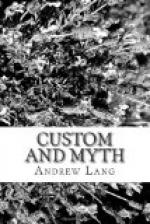This is the Maori story of the severing of the wedded Heaven and Earth. The cutting of them asunder was the work of Tutenganahau and his brethren, and the conduct of Tutenganahau is still held up as an example of filial impiety. {46a} The story is preserved in sacred hymns of very great antiquity, and many of the myths are common to the other peoples of the Pacific. {46b}
Now let us turn from New Zealand to Athens, as she was in the days of Pericles. Socrates is sitting in the porch of the King Archon, when Euthyphro comes up and enters into conversation with the philosopher. After some talk, Euthyphro says, ’You will think me mad when I tell you whom I am prosecuting and pursuing!’ ‘Why, has the fugitive wings?’ asks Socrates. ‘Nay, he is not very volatile at his time of life!’ ’Who is he?’ ‘My father.’ ’Good heavens! you don’t mean that. What is he accused of?’ ‘Murder, Socrates.’ Then Euthyphro explains the case, which quaintly illustrates Greek civilisation. Euthyphro’s father had an agricultural labourer at Naxos. One day this man, in a drunken passion, killed a slave. Euthyphro’s father seized the labourer, bound him, threw him into a ditch, ’and then sent to Athens to ask a diviner what should be done with him.’ Before the answer of the diviner arrived, the labourer literally ‘died in a ditch’ of hunger and cold. For this offence, Euthyphro was prosecuting his own father. Socrates shows that he disapproves, and Euthyphro thus defends the piety of his own conduct: ’The impious, whoever he may be, ought not to go unpunished. For do not men regard Zeus as the best and most righteous of gods? Yet even they admit that Zeus bound his own father Cronus, because he wickedly devoured his sons; and that Cronus, too, had punished his own father, Uranus, for a similar reason, in a nameless manner. And yet when I proceed against my father, people are angry with me. This is their inconsistent way of talking, when the gods are concerned, and when I am concerned.’
Here Socrates breaks in. He ’cannot away with these stories about the gods,’ and so he has just been accused of impiety, the charge for which he died. Socrates cannot believe that a god, Cronus, mutilated his father Uranus, but Euthyphro believes the whole affair: ’I can tell you many other things about the gods which would quite amaze you.’ {48}




